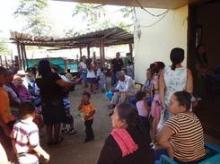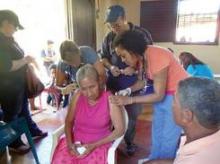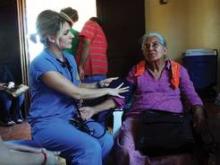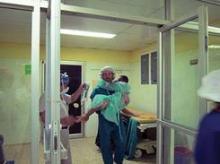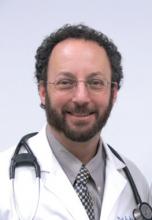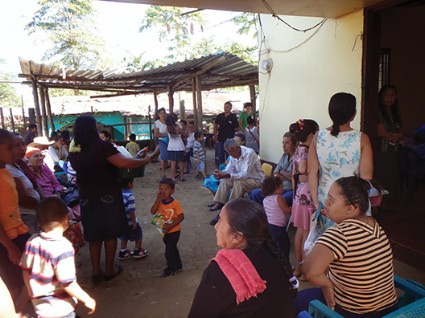User login
The poor are many
and so
impossible to forget.
Roberto Sosa, Honduran poet
In February, 20 physicians, nurses, and other health care personnel – including five members of the Family Medicine Residency Program at Abington (Pa.) Memorial Hospital – Dr. Kate Baranik, Dr. Magan Madsen, Dr. Margarita McDonald, Dr. John Russell, and Dr. Neil Skolnik – boarded a flight to Honduras for a medical mission to provide medical care to those in need there. Only 13% of people in the country have health insurance. The hospital bed ratio is 0.7 beds/1,000 people, as compared with the United States, where the ratio is 3 beds/1,000 people. These statistics make it evident that the health care system in Honduras needs restructuring. Although a group of Americans cannot restructure a whole health care system, the little steps we took in embarking on this journey to provide medical care has made a lasting impact on numerous lives, not least of which are our own.
Operation Heal Honduras was the culmination of 9 years of medical mission trips. What started as a small surgical team blossomed under the organizational leadership of an Abington Memorial Hospital general surgeon, Dr. Seth L. Newman, into a multidisciplinary group now including family medicine, general and trauma surgery, orthopedics, and ob.gyn. In addition to the five attending physicians, this year there were five residents-in-training, three certified registered nurse anesthetists, and multiple RNs and translators. While they vary in quality and cleanliness, Honduras has hospitals, operating rooms, and places to set up a clinic. More difficult is the job of obtaining the disposable items needed to perform operations and solve medical mysteries. Hospitals cannot afford to purchase these things. So the team brought gowns, gloves, sutures, gauze, mesh, casting material, ACE wraps, laparoscopic ports, drapes, and approximately $2,000 worth of medications.
While in Honduras, the team stayed at the Andrew Clinic located 15 miles north of El Progreso; the clinic is run by Dr. Florence Yoon and Dr. David Yoon. El Progreso is notable for its lush green mountains, palm trees, banana plants. On a typical day, the medical team set up a clinic in neighboring villages while the surgical team operated at the hospital in El Progreso.
One day specifically stands out in everyone’s mind. This day, like the others, started early, with a breakfast of scrambled eggs, beans, tortillas, mango, and cantaloupe, after which we left for the hospital and the mission medical clinic at 7 a.m. While driving to the hospital, it was impossible not to notice the poverty: the emaciated man walking on the side of the road with a plastic bag in hand; the muddy unpaved roads, branching off the side of the main road, each lined with wooden shacks with tin roofs; the rusted gutted cars on the side of the road; the Coca-Cola and Pepsi signs everywhere tempting people to spend money that they did not have on soda that they did not need. Everywhere we drove there were soldiers carrying machine guns to prevent crime, which is dramatically high in Honduras.
When we arrived at the hospital, the medical team consulted with the surgical team on a difficult case, and the surgeons were informed that the power to the hospital might be cut off at 8 a.m., as part of routine rotating power outages. It turned out that by 8:30, the power was still on, so the surgeons were able to operate in three operating rooms. The medical team then continued to the small village church where we were to stage a medical clinic. Pulling up to the church, we saw how the people lived in the village. They lived in small huts, with roosters, chickens, and dogs roaming freely in the muddy yards. Laundry was hanging outside each house, and smiling children played in the streets. Still, the medical team felt trepidation as we headed to care for the people in a neighborhood church built 3 years ago in a poor area of San Pedro Sula, the city known as the murder capital of the world.
Arriving, the bus turned into the narrow two-lane dirt street that was barely wider than the bus itself. When we disembarked the bus, we saw about a hundred people, young and old, waiting patiently for us in the church. The team saw about 400 people that day; we injected knees and shoulders, treated pneumonia in a young infant, gave prednisone for asthma, counseled an elderly woman with depression, gave antibiotics for wounds, saw a young child with clubfoot, and helped others who were tired, poor, and had headaches and joint pain. They waited a long time to be seen and receive the medical care we could give in the form of vitamins, antiparasite medications, antibiotics, skin creams, and others. That medical care that would not fix their lives, but it did make their lives a little better by virtue of medicines and knowing that someone cared enough to be there. Their smiles and their "gracias" connected them to us and told us a part of their story that could be told no other way.
Dr. Skolnik is professor of family and community medicine at, Temple University, Philadelphia, and associate director of the family medicine residency program there. Ms. Skolnik attends Drexel University and is a research assistant at the Children’s Hospital of Pennsylvania, both in Philadelphia. Ms. Ogen is a certified registered nurse anesthetist at Abington Memorial Hospital.
*Correction, 3/10/2014: An earlier version of this story misstated Ava Skolnik's name.
The poor are many
and so
impossible to forget.
Roberto Sosa, Honduran poet
In February, 20 physicians, nurses, and other health care personnel – including five members of the Family Medicine Residency Program at Abington (Pa.) Memorial Hospital – Dr. Kate Baranik, Dr. Magan Madsen, Dr. Margarita McDonald, Dr. John Russell, and Dr. Neil Skolnik – boarded a flight to Honduras for a medical mission to provide medical care to those in need there. Only 13% of people in the country have health insurance. The hospital bed ratio is 0.7 beds/1,000 people, as compared with the United States, where the ratio is 3 beds/1,000 people. These statistics make it evident that the health care system in Honduras needs restructuring. Although a group of Americans cannot restructure a whole health care system, the little steps we took in embarking on this journey to provide medical care has made a lasting impact on numerous lives, not least of which are our own.
Operation Heal Honduras was the culmination of 9 years of medical mission trips. What started as a small surgical team blossomed under the organizational leadership of an Abington Memorial Hospital general surgeon, Dr. Seth L. Newman, into a multidisciplinary group now including family medicine, general and trauma surgery, orthopedics, and ob.gyn. In addition to the five attending physicians, this year there were five residents-in-training, three certified registered nurse anesthetists, and multiple RNs and translators. While they vary in quality and cleanliness, Honduras has hospitals, operating rooms, and places to set up a clinic. More difficult is the job of obtaining the disposable items needed to perform operations and solve medical mysteries. Hospitals cannot afford to purchase these things. So the team brought gowns, gloves, sutures, gauze, mesh, casting material, ACE wraps, laparoscopic ports, drapes, and approximately $2,000 worth of medications.
While in Honduras, the team stayed at the Andrew Clinic located 15 miles north of El Progreso; the clinic is run by Dr. Florence Yoon and Dr. David Yoon. El Progreso is notable for its lush green mountains, palm trees, banana plants. On a typical day, the medical team set up a clinic in neighboring villages while the surgical team operated at the hospital in El Progreso.
One day specifically stands out in everyone’s mind. This day, like the others, started early, with a breakfast of scrambled eggs, beans, tortillas, mango, and cantaloupe, after which we left for the hospital and the mission medical clinic at 7 a.m. While driving to the hospital, it was impossible not to notice the poverty: the emaciated man walking on the side of the road with a plastic bag in hand; the muddy unpaved roads, branching off the side of the main road, each lined with wooden shacks with tin roofs; the rusted gutted cars on the side of the road; the Coca-Cola and Pepsi signs everywhere tempting people to spend money that they did not have on soda that they did not need. Everywhere we drove there were soldiers carrying machine guns to prevent crime, which is dramatically high in Honduras.
When we arrived at the hospital, the medical team consulted with the surgical team on a difficult case, and the surgeons were informed that the power to the hospital might be cut off at 8 a.m., as part of routine rotating power outages. It turned out that by 8:30, the power was still on, so the surgeons were able to operate in three operating rooms. The medical team then continued to the small village church where we were to stage a medical clinic. Pulling up to the church, we saw how the people lived in the village. They lived in small huts, with roosters, chickens, and dogs roaming freely in the muddy yards. Laundry was hanging outside each house, and smiling children played in the streets. Still, the medical team felt trepidation as we headed to care for the people in a neighborhood church built 3 years ago in a poor area of San Pedro Sula, the city known as the murder capital of the world.
Arriving, the bus turned into the narrow two-lane dirt street that was barely wider than the bus itself. When we disembarked the bus, we saw about a hundred people, young and old, waiting patiently for us in the church. The team saw about 400 people that day; we injected knees and shoulders, treated pneumonia in a young infant, gave prednisone for asthma, counseled an elderly woman with depression, gave antibiotics for wounds, saw a young child with clubfoot, and helped others who were tired, poor, and had headaches and joint pain. They waited a long time to be seen and receive the medical care we could give in the form of vitamins, antiparasite medications, antibiotics, skin creams, and others. That medical care that would not fix their lives, but it did make their lives a little better by virtue of medicines and knowing that someone cared enough to be there. Their smiles and their "gracias" connected them to us and told us a part of their story that could be told no other way.
Dr. Skolnik is professor of family and community medicine at, Temple University, Philadelphia, and associate director of the family medicine residency program there. Ms. Skolnik attends Drexel University and is a research assistant at the Children’s Hospital of Pennsylvania, both in Philadelphia. Ms. Ogen is a certified registered nurse anesthetist at Abington Memorial Hospital.
*Correction, 3/10/2014: An earlier version of this story misstated Ava Skolnik's name.
The poor are many
and so
impossible to forget.
Roberto Sosa, Honduran poet
In February, 20 physicians, nurses, and other health care personnel – including five members of the Family Medicine Residency Program at Abington (Pa.) Memorial Hospital – Dr. Kate Baranik, Dr. Magan Madsen, Dr. Margarita McDonald, Dr. John Russell, and Dr. Neil Skolnik – boarded a flight to Honduras for a medical mission to provide medical care to those in need there. Only 13% of people in the country have health insurance. The hospital bed ratio is 0.7 beds/1,000 people, as compared with the United States, where the ratio is 3 beds/1,000 people. These statistics make it evident that the health care system in Honduras needs restructuring. Although a group of Americans cannot restructure a whole health care system, the little steps we took in embarking on this journey to provide medical care has made a lasting impact on numerous lives, not least of which are our own.
Operation Heal Honduras was the culmination of 9 years of medical mission trips. What started as a small surgical team blossomed under the organizational leadership of an Abington Memorial Hospital general surgeon, Dr. Seth L. Newman, into a multidisciplinary group now including family medicine, general and trauma surgery, orthopedics, and ob.gyn. In addition to the five attending physicians, this year there were five residents-in-training, three certified registered nurse anesthetists, and multiple RNs and translators. While they vary in quality and cleanliness, Honduras has hospitals, operating rooms, and places to set up a clinic. More difficult is the job of obtaining the disposable items needed to perform operations and solve medical mysteries. Hospitals cannot afford to purchase these things. So the team brought gowns, gloves, sutures, gauze, mesh, casting material, ACE wraps, laparoscopic ports, drapes, and approximately $2,000 worth of medications.
While in Honduras, the team stayed at the Andrew Clinic located 15 miles north of El Progreso; the clinic is run by Dr. Florence Yoon and Dr. David Yoon. El Progreso is notable for its lush green mountains, palm trees, banana plants. On a typical day, the medical team set up a clinic in neighboring villages while the surgical team operated at the hospital in El Progreso.
One day specifically stands out in everyone’s mind. This day, like the others, started early, with a breakfast of scrambled eggs, beans, tortillas, mango, and cantaloupe, after which we left for the hospital and the mission medical clinic at 7 a.m. While driving to the hospital, it was impossible not to notice the poverty: the emaciated man walking on the side of the road with a plastic bag in hand; the muddy unpaved roads, branching off the side of the main road, each lined with wooden shacks with tin roofs; the rusted gutted cars on the side of the road; the Coca-Cola and Pepsi signs everywhere tempting people to spend money that they did not have on soda that they did not need. Everywhere we drove there were soldiers carrying machine guns to prevent crime, which is dramatically high in Honduras.
When we arrived at the hospital, the medical team consulted with the surgical team on a difficult case, and the surgeons were informed that the power to the hospital might be cut off at 8 a.m., as part of routine rotating power outages. It turned out that by 8:30, the power was still on, so the surgeons were able to operate in three operating rooms. The medical team then continued to the small village church where we were to stage a medical clinic. Pulling up to the church, we saw how the people lived in the village. They lived in small huts, with roosters, chickens, and dogs roaming freely in the muddy yards. Laundry was hanging outside each house, and smiling children played in the streets. Still, the medical team felt trepidation as we headed to care for the people in a neighborhood church built 3 years ago in a poor area of San Pedro Sula, the city known as the murder capital of the world.
Arriving, the bus turned into the narrow two-lane dirt street that was barely wider than the bus itself. When we disembarked the bus, we saw about a hundred people, young and old, waiting patiently for us in the church. The team saw about 400 people that day; we injected knees and shoulders, treated pneumonia in a young infant, gave prednisone for asthma, counseled an elderly woman with depression, gave antibiotics for wounds, saw a young child with clubfoot, and helped others who were tired, poor, and had headaches and joint pain. They waited a long time to be seen and receive the medical care we could give in the form of vitamins, antiparasite medications, antibiotics, skin creams, and others. That medical care that would not fix their lives, but it did make their lives a little better by virtue of medicines and knowing that someone cared enough to be there. Their smiles and their "gracias" connected them to us and told us a part of their story that could be told no other way.
Dr. Skolnik is professor of family and community medicine at, Temple University, Philadelphia, and associate director of the family medicine residency program there. Ms. Skolnik attends Drexel University and is a research assistant at the Children’s Hospital of Pennsylvania, both in Philadelphia. Ms. Ogen is a certified registered nurse anesthetist at Abington Memorial Hospital.
*Correction, 3/10/2014: An earlier version of this story misstated Ava Skolnik's name.
